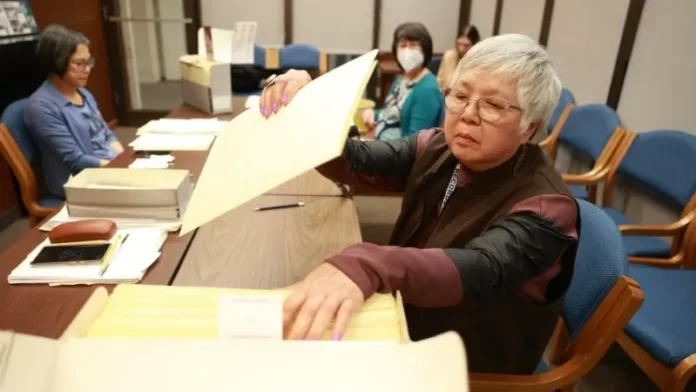The city of Seattle is home to a treasure trove of history, tucked away in the National Archives at Seattle. Among the 50,000 records stored there are documents from the Chinese Exclusion Act era, a dark period in American history that saw the banning of Chinese laborers from immigrating to the United States. Despite the discriminatory nature of these records, a group of dedicated volunteers has been working tirelessly to index and preserve these documents, uncovering stories of resilience and reconnecting families with their past.
The Chinese Exclusion Act of 1882 was a federal law that prohibited the immigration of Chinese laborers to the United States and denied citizenship to those already living in the country. This unjust law was in effect for over 60 years, until it was finally repealed in 1943. The National Archives at Seattle holds a vast collection of files from this period, shedding light on the experiences of Chinese people who were either entering or leaving the country.
The dedicated volunteers at the National Archives project have been working on indexing these documents for over 20 years. Each week, they gather at the archives, unsure of what kind of stories they will uncover. From intrusive interrogations of pregnant women to heart-wrenching letters from husbands to detention center authorities, the files offer a glimpse into the struggles and challenges faced by Chinese immigrants during this time.
Trish Hackett Nicola, a genealogist and historian, has been volunteering with the project since its inception. She shares some of the stories she has come across on the project’s blog, highlighting the resilience and determination of the Chinese people in the face of discrimination and adversity.
Valerie Szwaya, the director of archival operations at the National Archives at Seattle, explains that the immigration interrogations changed over the course of the exclusion period, becoming more detailed and invasive as the years went on. This is a testament to the unjust treatment of Chinese immigrants during this time.
For volunteer Rhonda Farrar, the project holds a personal significance. She was motivated to join the project in hopes of uncovering mysteries in her own family’s past. As she works with the files, she discovers that the questions asked by immigration officials were often intrusive and sometimes mundane, such as how many mirrors a person had in their home or where they kept their rice. However, sometimes they were about family, and Farrar was able to find a file on her father, Edwin Law, who died when she was a teenager. The file, which misspelled his name as “Low Yow Edwin,” contained a photo of him at age 23, and it brought tears to Farrar’s eyes. It was a powerful and emotional moment for her to connect with her father’s past in such a tangible way.
Another volunteer, Lily Eng, has also found personal connections through the project. She stumbled upon the files of several family members, including her great-grandfather, who went by the name of “Hop Lee.” Eng explains that her grandfather never spoke about his father, and they had no pictures of him. However, through the immigration files, she was able to learn more about her great-grandfather’s life and his return to America before her grandfather was even born.
Joyce Liu, a volunteer who joined the project a year ago, was moved by the stories she uncovered through the files. She reflects on the resilience and strength of the earlier generation of Chinese immigrants who came to America, facing numerous challenges and obstacles. One particular arrival form, which stated that a mother’s son had died on board the ship during their journey from southern China to Seattle, struck a chord with Liu. She was shocked and saddened by the mother’s loss and the difficult journey they endured. Liu sees the Chinese people who arrived in America during the Chinese Exclusion Act period as pioneers, paving the way for future generations of Chinese Americans.
As a Chinese American herself, Liu believes that understanding and learning from history is crucial in preventing it from repeating itself. She hopes that by sharing the stories and experiences of Chinese immigrants during the exclusion era, we can gain a better perspective and appreciation for the struggles they faced and ensure that history does not repeat itself.
The National Archives at Seattle’s project to index and preserve the records from the Chinese Exclusion Act era is not only important for historical purposes but also for personal and familial connections. The files hold valuable information for those looking to learn more about their family’s past and the struggles their ancestors endured. Through the dedication and hard work of the

